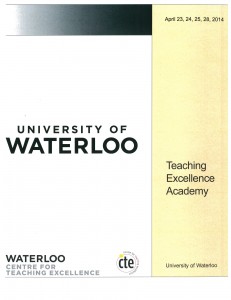Our work days get packed with various tasks – giving lectures, running discussions, holding meetings, getting caught up on the latest research literature. What part of your work day do you look forward to most?
In my job, I’m realizing that it’s more a time of the year which really energizes me. As CTE Director, I have a pretty heavy administrative load. I attend a lot of meetings, serve as a conduit for large volumes of information, interact with great staff and colleagues, and make numerous decisions. Each day has a different rhythm to it, and there’s always lots of interesting work to do. But with our annual Teaching Excellence Academy (TEA) happening this week and next, I’m realizing that what truly inspires me is my first love – teaching.
I get to spend four days co-facilitating an intensive course redesign workshop for 17 of our faculty members. We will discuss and explore the context, content, intended learning outcomes, assessment methods, and teaching methods for 17 different courses. We will contemplate how all of these course design elements can work together effectively, and we will give and receive feedback on the numerous design decisions being made. The variety in disciplines means we’ll all be learning many new things as we try to understand what students need to learn in courses about calculus, zoology, engineering design, and fiction. There will be lots of great questions to challenge our minds. Some participants will push back at being led outside of their comfort zones. Others will have so many ideas they will need to make some difficult decisions.
As someone who helps to lay out the path for the redesign experience, my anticipation is great. I think it’s the thrill of the unknown that’s most invigorating. How will the participants from this TEA cohort respond to the workshop? What ideas will they bring to the table? Will they change the design and/or delivery of their course?
For me, the prospect of change is the most compelling because it suggests that learning has occurred. Ambrose et al (2010) indicate that learning is “a process that leads to change, which occurs as a result of experience and increases the potential for improved performance and future learning” (p.3). To me, it’s exciting to be a part of and a witness to someone else’s learning. But the TEA participants aren’t the only ones who learn. I learn too. I learn about different courses, and the people who teach them. I learn about their questions, their struggles, and their triumphs. It’s inspiring to be part of something so dynamic, so real.
I can’t hope to speak for anyone else’s experiences as teachers. But I think it would be great if faculty members and teaching assistants at uWaterloo could all feel equally invigorated by teaching. If you’ve lost that feeling – or never quite had it – I encourage you to connect with a colleague who loves teaching. It could be someone in your department, or one of CTE’s staff members. Ask them what it is about teaching that inspires them. Could what they say become a reality for you? Let me know.
Reference:
Ambrose, S.A., Bridges, M.W., DiPietro, M., Lovett, M.C., Norman, M.K. (2010). How learning works: Seven research-based principles for smart teaching. San Francisco, CA: Jossey-Bass.
